150+ Things to Can Ask ChatGPT: A Fun Guide for Everyone

If you’re new to ChatGPT, you might wonder: “What exactly should I ask?” The truth is — almost anything!
But to get the best results, it helps to be specific and clear. Below are some smart and fun ways to use ChatGPT, organized by category. Each includes real examples you can try right away!
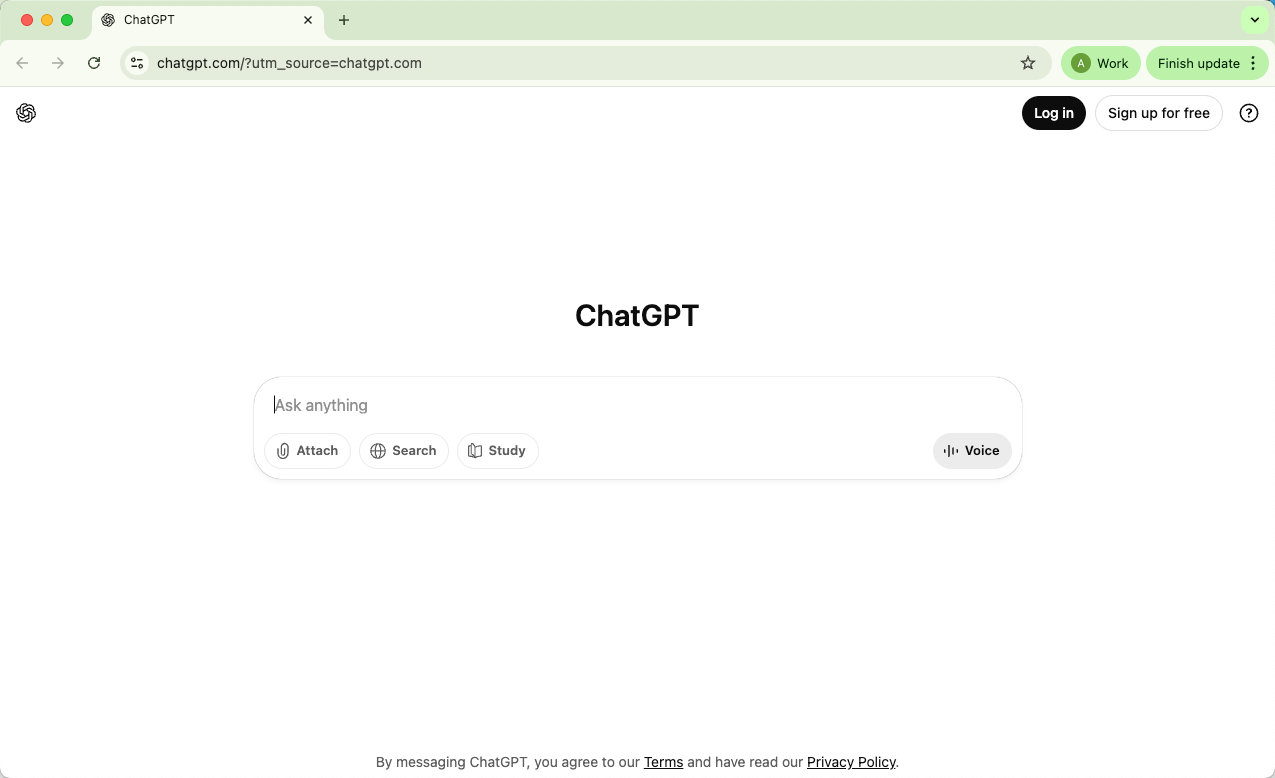
What Is ChatGPT and What Can You Do With It?
ChatGPT is an AI chatbot created by OpenAI. You can think of it as a smart assistant that understands your words and gives human-like answers. It can help you write, learn, plan, and create almost anything — just by chatting with it.
You can ask ChatGPT to:
Explain things simply — like what “cloud computing” means or how Wi-Fi works.
Write content — such as blog posts, essays, emails, or captions.
Summarize or translate text — turn long articles into short summaries or translate between languages.
Brainstorm ideas — get names for your business, gift ideas, or social media post topics.
Help with learning — solve math problems, explain science topics, or quiz you for exams.
Assist with daily tasks — plan meals, create schedules, or even help draft polite messages.
Think of ChatGPT as a tool that’s part research assistant, part writer, and part idea generator — all rolled into one. The better you explain what you need, the better its answers will be.
What Are the Best Questions to Ask ChatGPT?
1. Study and Learning Help
ChatGPT can act like a friendly teacher who never gets tired of explaining things. It can break down complex ideas into simple explanations, create study guides, quizzes, or even summaries of difficult textbooks. Whether you’re a student, self-learner, or just curious, it helps you understand things faster without the pressure of grades or deadlines.
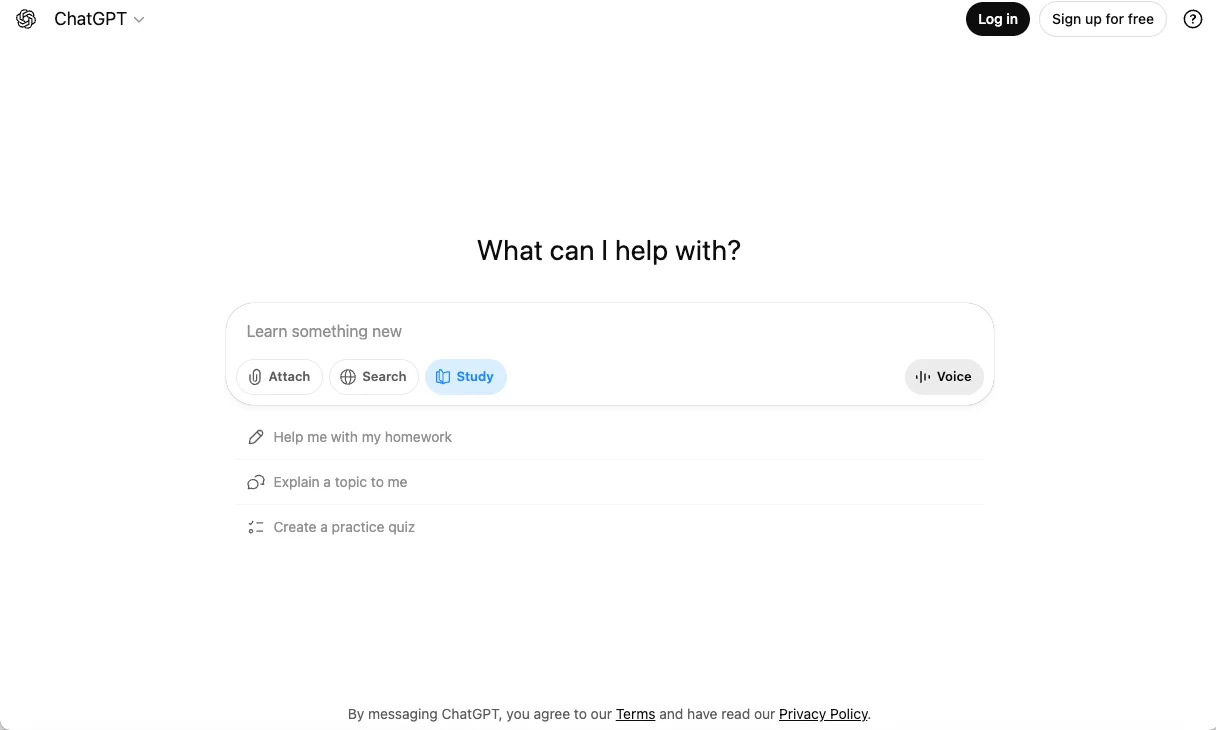
Prompts:
“Explain gravity in simple words.”
“Summarize the causes of the French Revolution.”
“Define what ‘photosynthesis’ means.”
“What’s the difference between RAM and ROM?”
“List the main parts of a cell.”
“Explain how climate change affects ocean currents, using simple language suitable for high school students.”
“Create a study plan to help me prepare for my biology exam in 7 days.”
“Write a short essay comparing capitalism and socialism in easy-to-understand terms.”
“Turn this paragraph into a summary I can memorize for my history test.”
“Explain how the stock market works as if I’m a complete beginner.”
2. Creative Writing and Story Ideas
When your imagination needs a push, ChatGPT can help you come up with stories, poems, or characters. It’s great for writers, students, or anyone who wants to explore creative thinking. You can ask it for story prompts, dialogue ideas, or help rewriting your drafts in a better tone.
Prompts:
“Give me a story idea about time travel.”
“Write a poem about friendship.”
“Create a funny story about a lost robot.”
“Give me names for fantasy characters.”
“Suggest 5 blog ideas about motivation.”
“Write a 300-word story about a scientist who accidentally creates an AI that can dream.”
“Help me write an emotional letter from a character who just achieved their life goal.”
“Give me 10 creative writing prompts for children aged 8–10.”
“Rewrite this paragraph to sound more poetic and vivid.”
“Generate a detailed outline for a short novel about space explorers discovering a new planet.”
3. Daily Advice and Motivation
Sometimes you need a little encouragement or a quick productivity tip. ChatGPT can give daily reminders, suggest routines, or offer advice to help you focus, manage stress, or build better habits. It’s like having a personal motivator who always has time to listen.
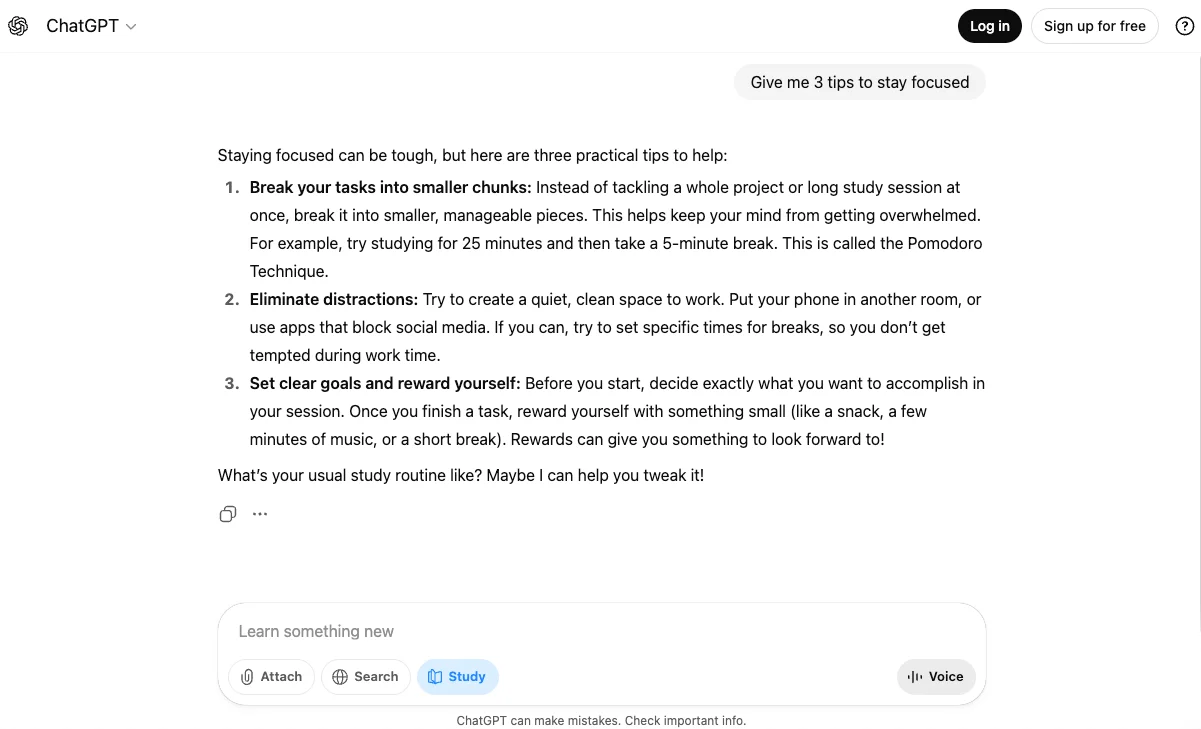
Prompts:
“Give me 3 tips to stay focused.”
“Motivate me to exercise today.”
“Share a positive quote about patience.”
“How do I stop procrastinating?”
“Suggest quick ways to feel happier.”
“Write a motivational message for me to read every morning before work.”
“Help me plan a daily schedule that balances study, rest, and hobbies.”
“Give me 10 easy habits that can improve my mental health.”
“Explain how to stay productive while working from home.”
“List practical steps to overcome fear of failure when trying something new.”
4. Cooking and Culinary Ideas
ChatGPT can easily become your personal kitchen assistant. It can recommend recipes, create meal plans, or help you cook with whatever ingredients you have. It’s perfect for beginners who want simple, step-by-step instructions or for food lovers looking to try something new.
Prompts:
“Give me a simple pasta recipe.”
“How do I make fluffy pancakes?”
“What can I cook with chicken and rice?”
“Suggest vegetarian dinner ideas.”
“Tell me how to bake brownies.”
“Create a 3-day meal plan for a person trying to eat healthy on a budget.”
“Explain how to make creamy mushroom soup with step-by-step instructions.”
“Suggest creative ways to use leftover bread.”
“Make me a grocery list for five easy dinners for two people.”
“Teach me how to cook traditional Japanese ramen from scratch.”
5. Health and Wellness Tips
ChatGPT can offer general wellness advice, daily exercise ideas, and mental health tips. It’s not a replacement for professional care, but it helps you stay mindful, active, and balanced in simple ways that fit your lifestyle.
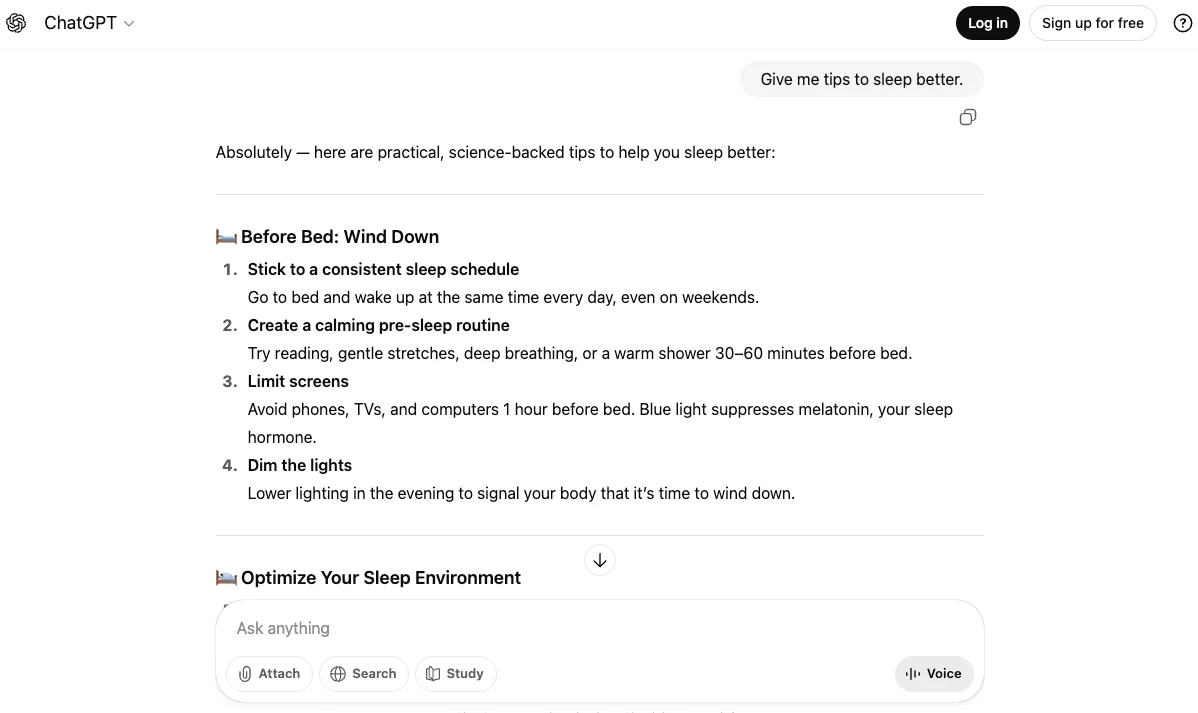
Prompts:
“List 5 easy stretches for beginners.”
“Give me tips to sleep better.”
“What are healthy breakfast ideas?”
“How do I drink more water daily?”
“Suggest short workouts I can do at home.”
“Create a weekly wellness plan that includes exercise, diet, and relaxation activities.”
“Explain how mindfulness meditation can reduce stress.”
“Give me a list of nutritious snacks for people who sit at a desk all day.”
“Write a 5-step morning routine to start my day feeling energized.”
“Suggest a simple yoga plan for beginners who want to improve flexibility.”
6. Language Practice and Translation
ChatGPT can act as your personal language partner. You can use it to learn new languages, improve your writing, and understand grammar better. It can translate sentences, correct your mistakes, or even have a conversation with you in the language you’re learning. This makes it a great, pressure-free tool for everyday practice.
Prompts:
“Translate this into Spanish: ‘Good morning, how are you?’”
“Correct my English: ‘He go to school every days.’”
“Teach me 5 common French greetings.”
“How do I say ‘thank you’ in Japanese?”
“Give me synonyms for the word ‘beautiful.’”
“Act as my English teacher and correct my paragraph, explaining each mistake.”
“Translate this full paragraph from English to Korean and keep the polite tone.”
“Create a daily 15-minute learning plan to help me learn basic Italian.”
“Give me examples of how to use phrasal verbs like ‘look up,’ ‘turn on,’ and ‘give in.’”
“Have a short conversation with me in Spanish, and correct my responses politely.”
7. Travel and Exploration
ChatGPT is a great travel buddy. It can help you plan trips, find destinations, learn about cultures, and even practice local phrases before your journey. You can ask it to make itineraries, suggest hidden gems, or help pack for your trip.
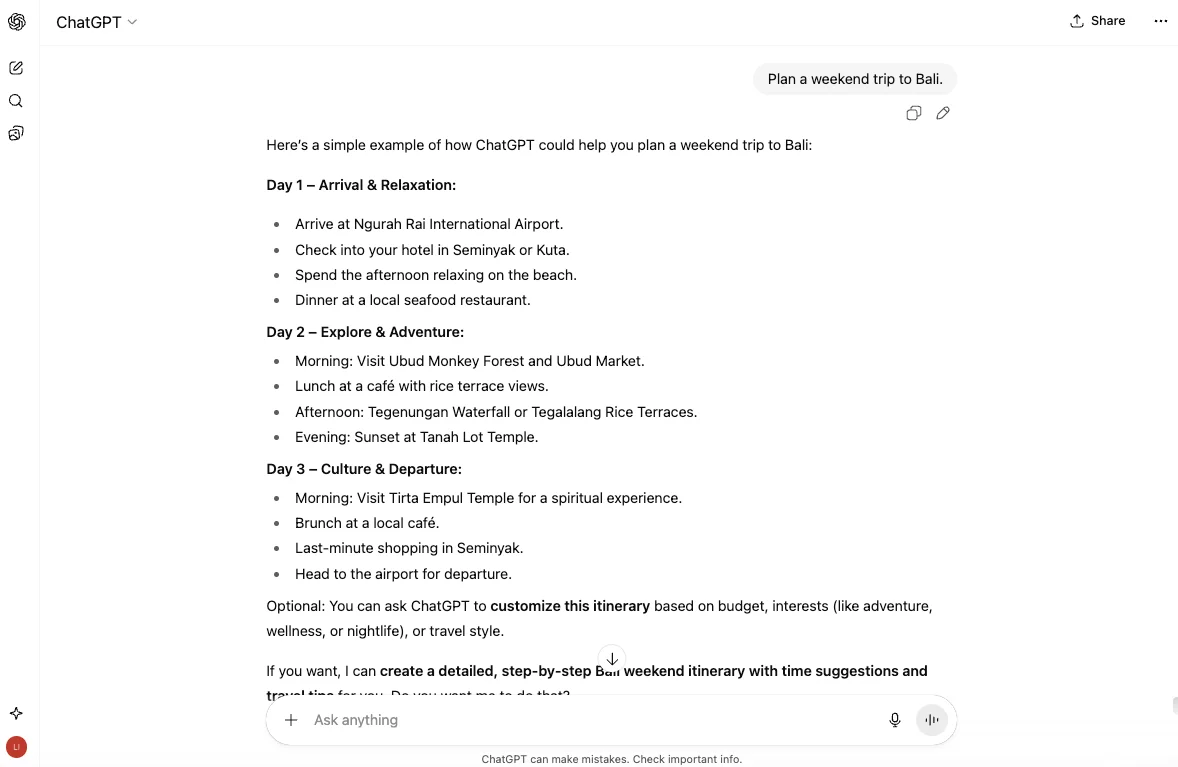
Prompts:
“Plan a weekend trip to Bali.”
“What are the best things to do in Paris?”
“Teach me basic Thai phrases for travel.”
“List top 5 travel apps I should download.”
“Suggest budget-friendly European destinations.”
“Create a 7-day Japan itinerary including Tokyo, Kyoto, and Osaka with food suggestions.”
“Recommend safe solo travel destinations for women in Southeast Asia.”
“Write a packing checklist for a 2-week summer vacation in Italy.”
“Suggest a cultural experience I shouldn’t miss in Morocco.”
“Help me plan a low-cost road trip across the U.S. with scenic routes.”
8. Finance and Money Management
ChatGPT can explain money-related topics in a way anyone can understand. It can help you learn how to budget, save, or invest wisely — even if you have zero background in finance. You can also use it to generate financial plans or clarify confusing financial terms.
Prompts:
“Explain what compound interest is.”
“Give me 5 tips to save money.”
“What’s the difference between a debit and credit card?”
“List simple ways to earn extra income online.”
“Explain inflation in simple terms.”
“Create a beginner-friendly monthly budget plan for someone earning $2,000 per month.”
“Explain how the stock market works using a simple example.”
“List common financial mistakes people in their 20s make and how to avoid them.”
“Teach me how to track my expenses using a spreadsheet.”
“Explain the pros and cons of investing in cryptocurrency for beginners.”
9. Fun and Entertainment
ChatGPT isn’t just for serious tasks — it’s also great for fun! You can ask it to tell jokes, create stories, make riddles, or even come up with games you can play with friends. It’s a quick way to add some humor and creativity to your day.
Prompts:
“Tell me a joke about cats.”
“Write a short riddle.”
“Make up a funny story about a superhero grandma.”
“Create a tongue twister using my name.”
“Tell me a random fun fact.”
“Write a funny birthday poem for my best friend who loves pizza.”
“Make a short comedy sketch about students in an online class.”
“Create a game I can play at a family gathering without using props.”
“Write a parody song about Mondays at work.”
“Generate a creative quiz with 10 fun questions about movies.”
10. Tech and Future Trends
If technology confuses you, ChatGPT can make it easy. It explains new tech concepts — like AI, blockchain, and cybersecurity — in plain English. You can also ask it about trends shaping the future, from smart homes to robots. It’s like having a tech guide who makes complex topics simple.
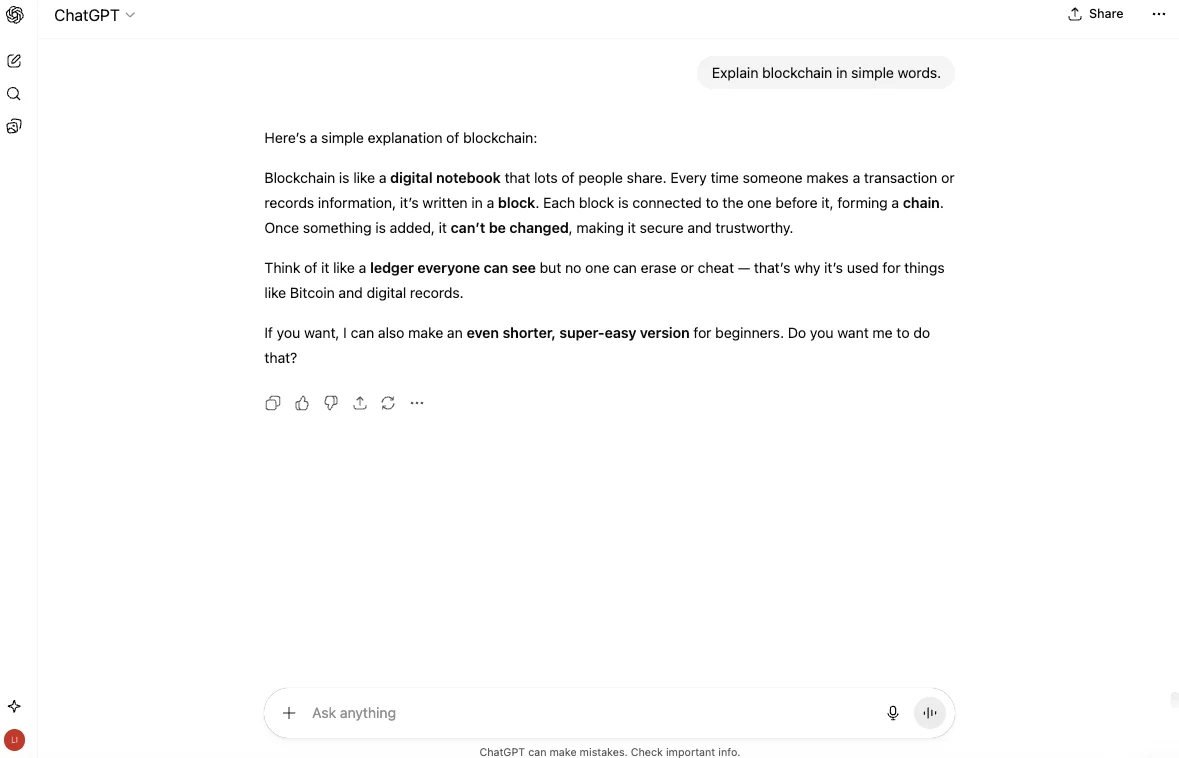
Prompts:
“What is artificial intelligence?”
“Explain blockchain in simple words.”
“What does ‘cloud computing’ mean?”
“How do smart homes work?”
“List future tech trends for 2030.”
“Explain how self-driving cars use AI to make decisions.”
“Describe how virtual reality can change the way we learn.”
“Compare the pros and cons of renewable energy technology.”
“Summarize what quantum computing is and why it’s important.”
“Explain how 5G networks improve mobile communication.”
11. Environmental Awareness
ChatGPT can help you learn how to live more sustainably and understand environmental issues. It can explain climate change, green technology, and eco-friendly habits in clear, practical ways. Whether you want to reduce waste or learn about renewable energy, ChatGPT can guide you step by step.
Prompts:
“What is climate change?”
“List 5 ways to save energy at home.”
“Explain why recycling is important.”
“What are renewable energy sources?”
“How does deforestation affect animals?”
“Explain how electric cars help reduce air pollution.”
“Create a daily eco-friendly routine for someone living in an apartment.”
“Suggest creative ways schools can promote sustainability.”
“Describe the process of how solar panels generate electricity.”
“Give me 10 small lifestyle changes that reduce my carbon footprint.”
12. Historical Insights
ChatGPT makes history more engaging and easy to understand. It can summarize key events, explain why they mattered, or tell stories about famous people from the past. You can use it to review for exams or just satisfy your curiosity about how the world used to be.
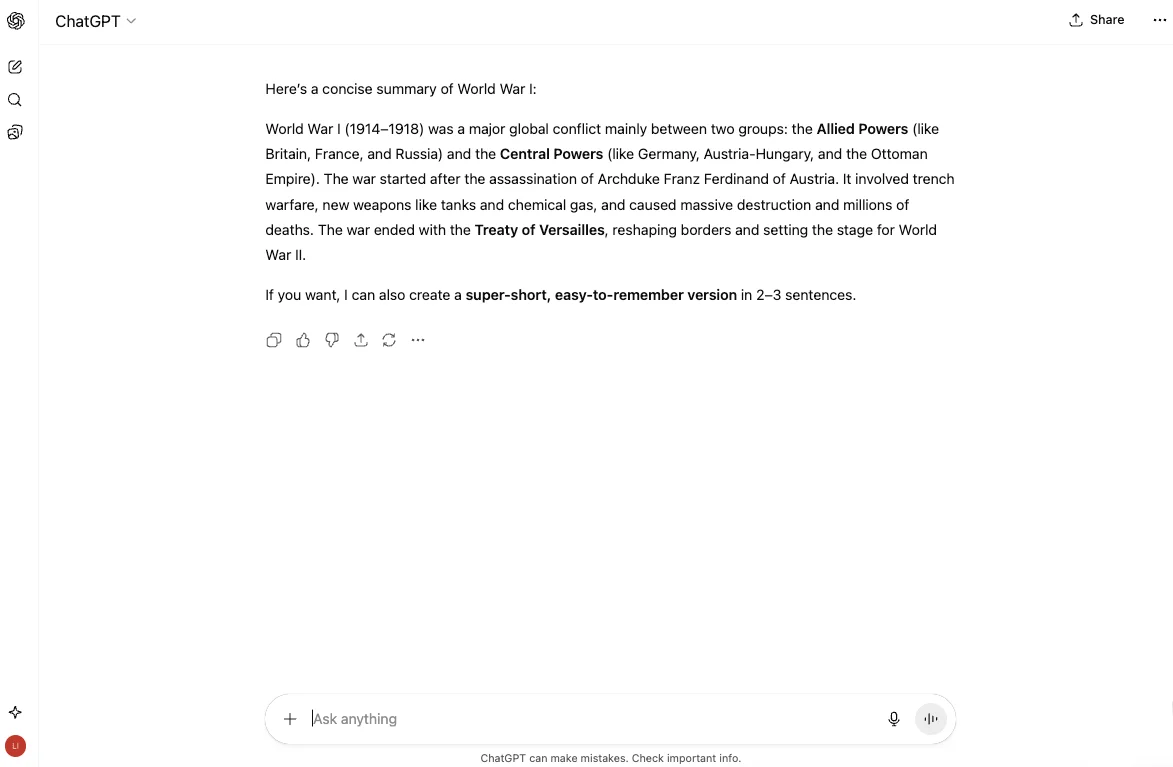
Prompts:
“Who was Cleopatra?”
“Summarize World War I.”
“What caused the fall of the Roman Empire?”
“Explain the Industrial Revolution.”
“When was the first airplane invented?”
“Describe how the printing press changed the spread of information in Europe.”
“Explain the causes and outcomes of the American Civil War.”
“Compare the leadership styles of Napoleon Bonaparte and Julius Caesar.”
“Tell the story of the Great Wall of China and why it was built.”
“Summarize how the Cold War shaped global politics.”
13. Personalized Learning and Skills
ChatGPT can help you learn a new skill at your own pace. Whether you want to learn a language, start coding, improve public speaking, or play an instrument, it can design study plans, give practice ideas, and track progress. It’s like having a personal learning coach.
Prompts:
“How do I start learning Python?”
“Teach me basic photography tips.”
“List 5 ways to improve my writing.”
“How can I become more confident in speaking?”
“Explain the basics of drawing faces.”
“Create a 30-day plan to learn basic guitar chords and songs.”
“Design a weekly schedule for improving my English vocabulary.”
“Teach me how to use Excel for managing small business finances.”
“Explain how to improve my presentation skills step by step.”
“Give me a full learning path to become a web developer, from beginner to intermediate.”
14. Self-Improvement and Life Balance
ChatGPT can help you grow personally and manage your time, emotions, and goals. It’s great for anyone looking to improve focus, build better habits, and live a more balanced life. It can guide you with reflections, journaling prompts, or action plans that actually work.
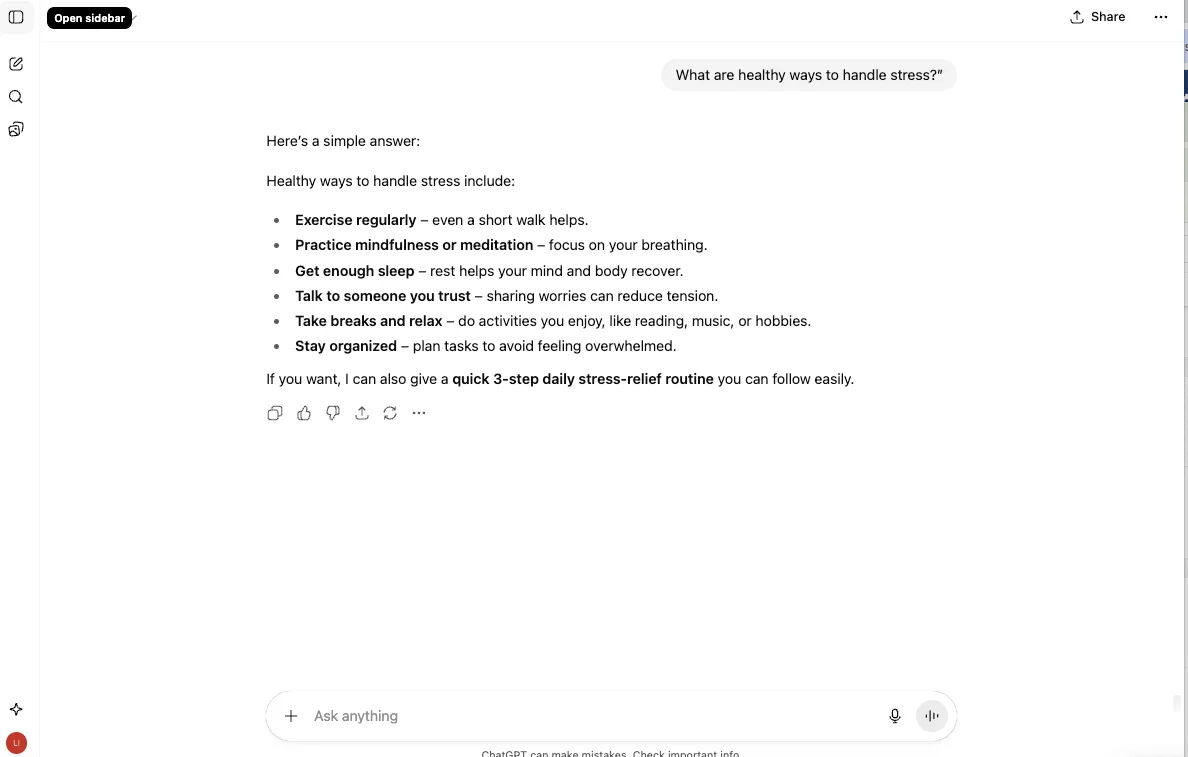
Prompts:
“Give me daily habits to be more productive.”
“How can I stay positive?”
“List 5 ways to improve self-discipline.”
“Suggest time management tips for students.”
“What are healthy ways to handle stress?”
“Create a 7-day routine to help me build better work-life balance.”
“Write journal prompts for self-reflection and personal growth.”
“Explain how to set realistic goals and track progress.”
“Give me a simple evening routine to relax after a long day.”
“List daily affirmations I can use to boost self-confidence.”
15. Just for Curiosity
Sometimes, you just want to ask interesting or “what if” questions — and ChatGPT loves those. You can explore creative, imaginary, or philosophical ideas that make you think differently. These fun questions often lead to surprisingly deep and entertaining answers.
Prompts:
“What if gravity suddenly disappeared?”
“Could humans live on Mars?”
“What’s at the center of the Earth?”
“How big is the universe?”
“What would happen if animals could talk?”
“Imagine a world where humans never needed to sleep — how would life change?”
“Describe how a city would work if it floated above the ocean.”
“Explain what would happen if technology stopped working for a week worldwide.”
“Write a story about an alien visiting Earth for the first time.”
“What are 5 scientific mysteries that humans still haven’t solved?”

Tips to Write Good ChatGPT Prompts
Writing a good ChatGPT prompt is simple once you know how to talk to it. Think of ChatGPT as a smart helper who understands you better when you give clear directions. The more specific and natural you are, the better your results will be.
Here’s how to do it:
1. Talk to ChatGPT Like You Would Talk to a Person
You don’t need to sound formal or use complicated words. ChatGPT understands normal conversation. Just ask naturally, the way you’d talk to a helpful friend.
❌ Wrong Example: “Provide culinary information related to dinner preparation.”
✅ Right Example: “Can you give me a few easy dinner recipes using chicken and rice?”
2. Provide Context
Tell ChatGPT what you’re trying to do and who it’s for. The more background you give, the more specific and useful the response will be.
❌ Wrong Example: “Write about exercise.”
✅ Right Example: “Write a short blog post about simple exercises for people who work from home.”
3. Tell ChatGPT to Assume an Identity or Profession
You can ask ChatGPT to act like a teacher, travel expert, chef, or any role that fits your goal. This helps shape the tone and depth of the answer.
❌ Wrong Example: “Give me workout ideas.”
✅ Right Example: “Act as a fitness trainer and create a weekly workout plan for beginners.”
4. Keep Your Target Audience in Mind
Tell ChatGPT who you want the answer written for — kids, students, professionals, or general readers. That way, it adjusts the tone and level of detail.
❌ Wrong Example: “Explain what blockchain is.”
✅ Right Example: “Explain what blockchain is in a simple way for someone who’s never studied technology.”
5. Ask One Question at a Time
If you ask too many things in one message, ChatGPT may skip details. It’s better to focus on one request before moving to the next.
❌ Wrong Example: “Explain climate change, list its effects, and write a slogan for my campaign.”
✅ Right Example: “Explain climate change in simple terms. Then I’ll ask you to list its effects.”
6. Be Clear and Specific
Avoid vague or general questions. The more direct your request, the more accurate the answer.
❌ Wrong Example: “Tell me about technology.”
✅ Right Example: “Explain how artificial intelligence is used in education.”
7. Use Simple Language
There’s no need for long or complex sentences. Clear and simple wording helps ChatGPT understand your intent better.
❌ Wrong Example: “Kindly elucidate the multifaceted advantages of implementing renewable energy systems.”
✅ Right Example: “Explain the main benefits of using renewable energy.”
8. Don’t Overload Information
Too many details or instructions in one prompt can confuse the AI. Keep your request short and organized.
❌ Wrong Example: “I’m planning a family vacation to Italy in July, need hotel suggestions, activities, transportation details, meal plans, and a budget guide — all for a group of six.”
✅ Right Example: “Suggest fun activities for a family vacation in Italy.”
(Then you can ask about hotels, food, and transport one by one.)
9. Stay Neutral
Avoid questions that already assume an answer. Neutral prompts help ChatGPT give balanced and fair responses.
❌ Wrong Example: “Why is technology bad for children?”
✅ Right Example: “What are the pros and cons of children using technology?”
10. Don’t Depend on ChatGPT Too Much
ChatGPT is a great helper, but it’s not perfect. Always review, fact-check, and add your own ideas to make the result truly yours.
❌ Wrong Example: “Write my entire blog post. I’ll publish it as-is.”
✅ Right Example: “Help me draft a blog post. I’ll edit and add my personal experience before posting.”
FAQ
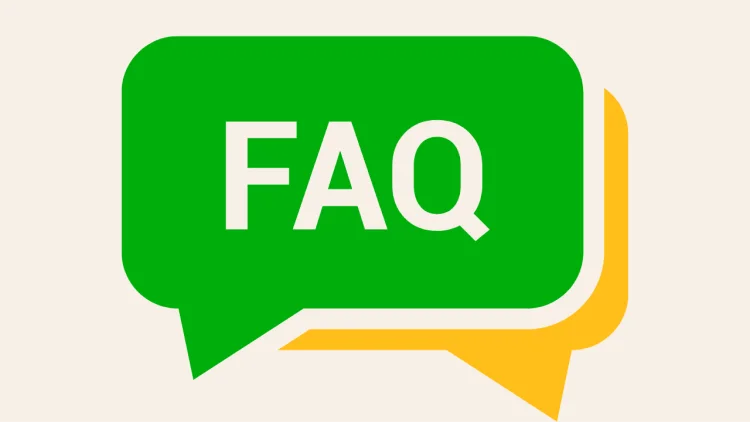
1. What kinds of questions are best suited for ChatGPT?
ChatGPT works well with questions that are clear, specific, and focused. It excels at explaining concepts, generating ideas, summarizing information, and assisting with writing tasks.
2. Can ChatGPT provide advice or opinions?
Yes, but its advice is general and not personalized. It cannot replace professional guidance for medical, legal, or financial matters.
3. Are there questions ChatGPT cannot answer?
ChatGPT cannot access private information, provide real-time updates, or give answers requiring personal judgment or confidential data.
4. How should I ask questions to get better answers?
Use simple, clear language, provide context, define your audience, and focus on one topic at a time. You can also ask ChatGPT to take on a role, like a teacher or chef, to shape its response.
5. How does ChatGPT deal with unclear or vague prompts?
It may give a general response or try to guess what you mean. Clear, detailed prompts usually produce more accurate and useful answers.
6. What are the things you shouldn't tell ChatGPT?
Don’t share passwords, credit card info, personal identification, sensitive health details, or private work data. Keep it safe and general.
7. Can ChatGPT adapt its answers for different audiences?
Yes. By specifying the audience — such as beginners, children, or experts — you can get responses in the right tone and level of complexity.
8. Is it possible to detect if something was written by ChatGPT?
There’s no guaranteed method. Some tools claim to detect AI writing, but reviewing content for style, originality, and factual accuracy is usually necessary.
9. How can I make ChatGPT more interactive or dynamic?
You can ask follow-up questions, request examples, ask it to explain its reasoning, or use step-by-step instructions to create dialogue-like exchanges.
10. Will ChatGPT always give the same answer to the same question?
Not necessarily. Answers may vary depending on how the question is phrased, the context provided, or any specific instructions you include.
11. What are the main limitations of ChatGPT?
It can provide incorrect, outdated, or overly general information. It cannot access private data, make decisions for you, or provide professional-level advice.
12. What can I ask ChatGPT about me?
You can ask it for advice, writing help, goal planning, study tips, or creative ideas—but avoid private or sensitive personal info.
13. What are some cool things ChatGPT can do?
It can write stories, generate ideas, explain concepts, create meal plans, summarize articles, give travel tips, help learn languages, or make jokes.
Conclusion
So, there you have it — tons of ideas for what you can ask ChatGPT. The trick is just to be curious, clear, and a little creative.
Start asking, exploring, and see how it can make learning, writing, or even just having fun way easier. Trust me, once you start playing around with it, you’ll be surprised at how much this little AI helper can do!
